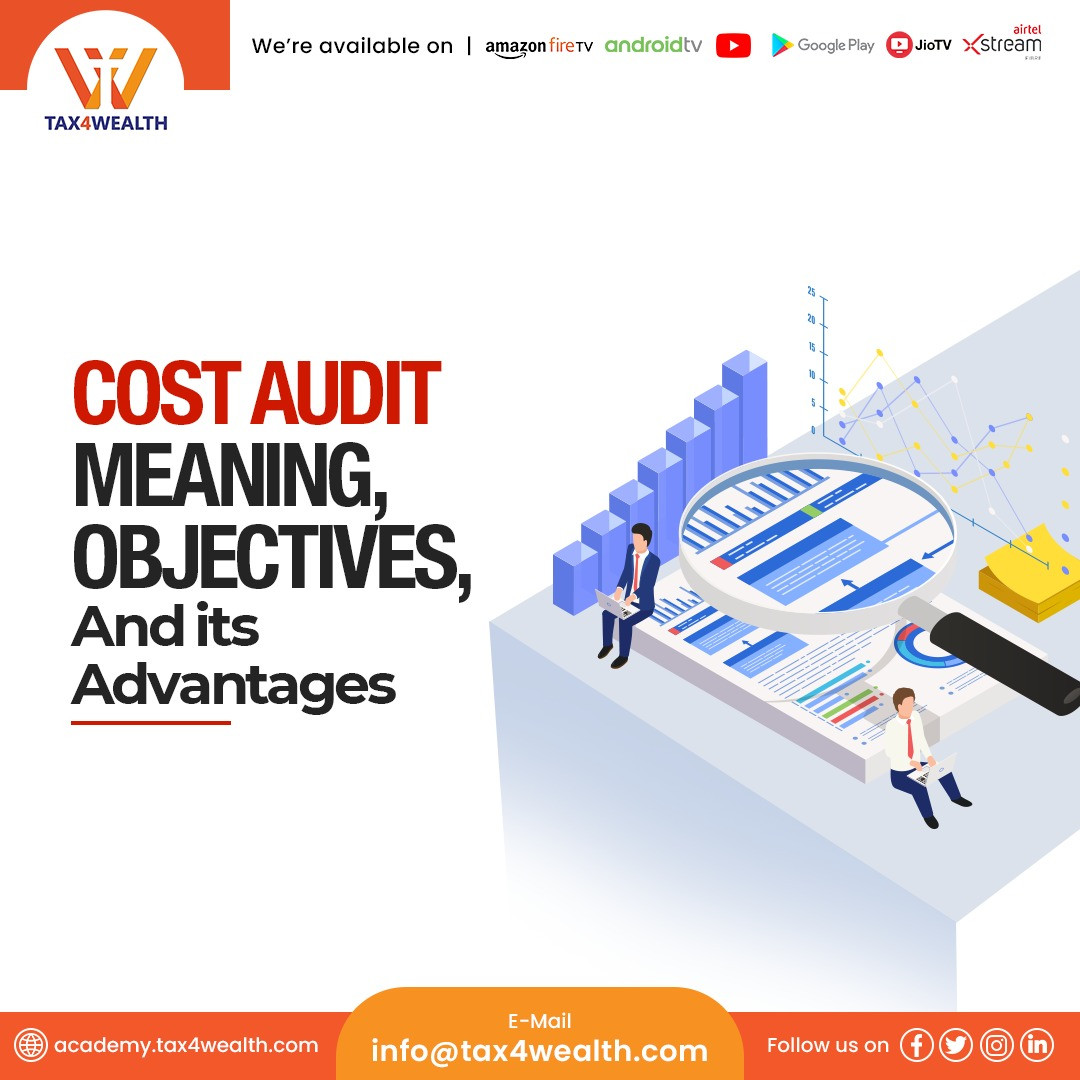
Cost Audit Meaning, Objectives, and its Advantages
This blog will help in learning the cost audit concept in cost accounting. You will find its meaning, objectives, benefits, and drawbacks. Let's go check it out.
A cost audit is a systematic study of a company's or organization's expense accounts and records. It ensures that the cost of its products or services has been correctly categorized and computed. In addition, consistent cost accounting concepts and methodologies outlined in applicable rules and standards are employed.
What is Cost Audit?
A cost audit examines a non-profit entity's expense records and other related information. The major goal of this strategy is to assure stakeholders such as shareholders, management, and regulatory authorities that a company's cost information is credible and by applicable legislation and standards.
Cost Audit Consists of The Following Elements:
(a) Checking the cost accounting records for the correctness of cost accounts, cost reports, cost statements, and cost data; and
(b) Examining these records to ensure that they are by cost accounting principles, plans, methods, and objectives.
The cost auditors' approach should guarantee that the cost accounting strategy adheres to the organization's objectives and that the accounting system is directed toward achieving these objectives. The cost auditor should also prove the accuracy of the statistics by vouching for verification, reconciliation, and so on.
Also read; Difference Between Trading Account, Profit and Loss Account
Objectives of Cost Audit:
✓ Verifying cost data accuracy: A cost auditor checks a company's cost accounts and records to confirm that the reported cost data is accurate, dependable, and free of substantial misstatements.
✓ Improving cost control: It helps a corporation in identifying areas where its cost control systems might be improved. As a result, it results in cost savings and increased profitability.
✓ Identifying inefficiencies: It assists in identifying areas where a firm may be spending needless expenses or where manufacturing processes may be improved to decrease costs.
✓ Ensuring regulatory compliance: A corporation follows appropriate norms and guidelines, such as those established by governmental authorities or professional organizations.
✓ Improving decision-making skills: It gives executives a better grasp of the cost structure of the organization. Furthermore, it enables them to make better-educated judgments on cost-related issues.
Benefits of Cost Audit:
Management, society, shareholders, and the government all gain from cost auditing. The benefits are as follows:
Benefits of Management:
✓ Management receives trustworthy data for its daily activities, such as price setting, control, decision-making, etc.
✓ Management will keep a close check on all wastages if there is a reliable reporting system in place.
✓ To assist remedial action, inefficiencies in the way the firm operates will be made public.
✓ By giving each manager their own set of tasks, management by exception becomes viable.
✓ The standard costing method and budgetary control will be made much easier.
✓ A business can set up a trustworthy check on the closing stock and work-in-progress valuation.
✓ It helps in the fraud and error detection process.
Society:
✓ Cost auditing is frequently a part of price fixing. As a result, according to information from Audit Cost, setting prices protects customers from being taken advantage of.
✓ Given that certain sectors of the economy forbid price rises without a valid rationale, such as a rise in manufacturing costs. Preventing price increases, will lower inflation and sustain consumer living standards.
Shareholder:
A cost audit makes sure that accurate records are kept about the acquisition and use of goods, salary costs, etc. Additionally, it makes sure that work-in-progress and closed stocks are fairly valued. Companies may guarantee their shareholders a reasonable return on investment in this way.
Government:
✓ When the government engages in a cost-plus contract, a cost audit helps in determining a fair price for the contract.
✓ It establishes the maximum pricing for necessities, preventing unauthorized profiteering.
✓ The government could focus on ineffective departments due to cost audits.
✓ It gives the government the option to decide to preserve particular businesses.
✓ It makes it easier for government-requested trade disputes to be resolved.
✓ Cost audits and the ensuing management decisions might encourage wholesome rivalry among the many businesses in the sector. As a result, inflation is automatically controlled.
Drawbacks of Cost Audit:
Cost audits have many drawbacks in addition to their numerous positives. Among the most important drawbacks are the following:
✓ Cost: Carrying out a cost audit may be expensive and time-consuming. Specialized auditors must be hired for this procedure, and their costs may be expensive.
✓ Complexity: A cost audit entails a thorough investigation of the cost accounts and records of a firm, which can be challenging and call for a high degree of competence.
✓ Management opposition: Businesses may see cost audits as an intrusion into their business operations and oppose the audit process. As a result, management might not cooperate as expected, which would make the audit process less efficient.
✓ Difficulty in fraud detection: A cost audit is ineffective for fraud detection. As a result, it may be challenging for auditors to spot fraudulent actions, particularly if they are well-masked.
✓ Limited scope: It only considers the operational costs of a corporation. Furthermore, it doesn't give a whole picture of its financial success.
Reliance on past data: Past cost data is the foundation of a cost audit. Future market circumstances or trends that might impact the price of goods or services are not taken into account.
For more information , Visit us at: https://academy.tax4wealth.com/
Related News
No comments yet, Be the first to comment.











